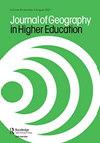基于田野调查的本科生局部流研究:一种基于探究的方法
IF 1
4区 教育学
Q2 EDUCATION & EDUCATIONAL RESEARCH
引用次数: 0
摘要
体验式学习被认为是一种影响深远的教育实践。田野调查是地理传统的重要组成部分。当使用基于探究的方法实施时,实地考察可以成为体验式教育的一种非常有效的形式。然而,由于后勤方面的挑战,许多地理教师不愿实施探究式实地考察。在这里,提出了一个模块化的、长达一个学期的实地考察设计,包括对当地河流的探究式研究。该框架已在本科班级成功实施两次。在美国北卡罗来纳州格林斯博罗市,共有37名大学生对城市溪流进行了物理栖息地评估和水质监测。定量和定性匿名学生评价和学生工作成果为该方法在提高学生学习方面的有效性提供了初步支持。所提出的实地工作设计的实际优点是,它比完全基于实地的课程在时间和金钱上花费更少,它将一个大班分解为更易于管理的小组大小,并且它减轻了一些关于可访问性、公平性和风险管理的常见问题。虽然还需要系统地评估,但教学上的好处可能包括批判性思维、解决问题、沟通、人际关系和情感技能的发展。本文章由计算机程序翻译,如有差异,请以英文原文为准。
Field-based local stream research in undergraduate classes: an inquiry-based approach
ABSTRACT Experiential learning is recognized as a high-impact educational practice. Fieldwork is an important component of the geographic tradition. When implemented using an inquiry-based approach, fieldwork can be a highly effective form of experiential education. However, many geography instructors are dissuaded from implementing inquiry-based fieldwork because of logistical challenges. Here, a modular, semester-long fieldwork design is presented, involving inquiry-based research on local streams. This framework has been successfully implemented twice in undergraduate classes. A total of 37 undergraduate students did physical habitat assessments and water-quality monitoring on urban streams in Greensboro, North Carolina, USA. Quantitative and qualitative anonymous student evaluations and student work products provide preliminary support for the approach’s effectiveness in enhancing student learning. The practical advantages of the presented fieldwork design are that it is less costly in time and money than fully field-based courses, it breaks up a large class into more manageable group sizes, and it alleviates some of the common concerns about accessibility, equity, and risk management. While still needing to be systematically assessed, the pedagogical benefits potentially include development of critical thinking, problem-solving, communication, interpersonal, and affective skills.
求助全文
通过发布文献求助,成功后即可免费获取论文全文。
去求助
来源期刊

Journal of Geography in Higher Education
Multiple-
CiteScore
5.80
自引率
9.50%
发文量
29
期刊介绍:
The Journal of Geography in Higher Education ( JGHE) was founded upon the conviction that the development of learning and teaching was vitally important to higher education. It is committed to promote, enhance and share geography learning and teaching in all institutions of higher education throughout the world, and provides a forum for geographers and others, regardless of their specialisms, to discuss common educational interests, to present the results of educational research, and to advocate new ideas.
 求助内容:
求助内容: 应助结果提醒方式:
应助结果提醒方式:


